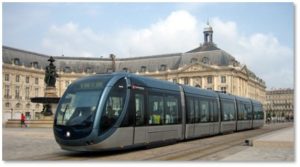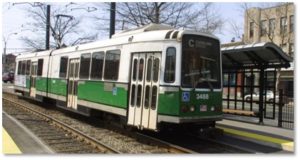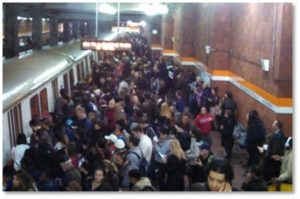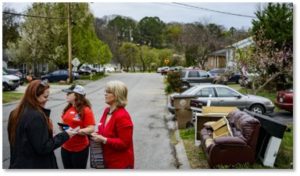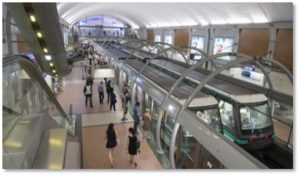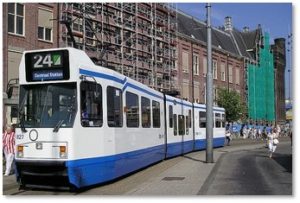In Europe, city residents travel on excellent public transportation. Trams and subways are clean, efficient, and safe. They run on time. Everyone takes this for granted. It works.
I have ridden on the Paris Metro, the GVB in Amsterdam, the tramway in Bordeaux, and the London Underground. All were nicer, more pleasant, more comfortable, and more affordable than the Boston MBTA or the New York City subways, both of which I have used regularly. In my experience, only the Washington DC Metro comes close.
Why is this the case? Why can Europeans have excellent public transportation while Americans suffer with systems that can’t seem to run well or affordably? It always feels like a fight to improve what we have or build new public transportation?
The War Against Public Transportation
Well, because it is a fight. And it’s one in which the people who need public transportation to live their lives, to get to work and the home again, have the least power and the most to lose.
It’s not that we got into the public transportation business later than other countries. Boston built American’s very first subway back in 1897, followed by New York City in 1904. American cities used to have extensive trolley and streetcar systems to move city residents around and to get them out of the city on weekends.
Europe, on the other hand, had to rebuild their entire transportation infrastructure after World War II.
We Have the Riders
We don’t lack for people to ride public transportation. Millions of city dwellers either need or prefer to get around without cars, whether their own, a rental, or a ride-share service. A lot of low-income workers couldn’t afford them anyway. Developing places like Boston’s Seaport District need efficient public transportation and the demand grows stronger every day. Clogging city streets with more cars, regardless of how they operate, does not solve the problem.
Yet in Boston, the T cars are often dirty, overcrowded, break down regularly, and can’t seem to run on a schedule. Finding the money to fix the myriad problems is a perennial problem. Big snow chokes the whole system to a halt.
If you live in the suburbs and want to take a train into the city, good luck with that. Suburban parking is inadequate to the demand and expensive. Sometimes you need a resident sticker just to get in.
Surely, we can do better than this. We could if we tried. We often don’t try. Here’s why.
Enter the Koch Brothers
Charles G. and David H. Koch make their multiple billions in the oil industry. They love cars. Big, honking, gasoline-sucking cars, pollution-spewing cars. The more the better.
They don’t like public transportation because people who ride trains and trolleys and light-rail vehicles don’t use oil. People without cars are happy to dodge the expense, the maintenance, the fees and the parking.
This threatens the Koch brothers’ ability to make their next billion dollars by selling more oil and gas. Why?
A Simple Equation
It’s a simple equation and one that’s easy to understand. The Koch brothers don’t want competition from any system that takes away from the profits they earn from oil and gas. Under the banner of preventing higher taxes, they have engaged in a campaign (remember, it’s a war) designed to stop the construction of public transportation around the country.
Their political advocacy group, Americans for Prosperity, conducts grass-roots, door-to-door activities that persuade people to vote down the very support they need. It’s transportation that will get workers to their jobs and anywhere else they need to go so they can prosper.
Workers suffer when getting to work is a problem. Businesses struggle when workers can’t show up on time—or get there at all.
The Koch brothers don’t care. They fund their scam all over the country, blanketing the media with duplicitous ads so people will vote against their own best interests. And the cars will keep rolling.
Whose Prosperity?
Americans for Prosperity (theirs, not yours) fans out through neighborhoods to hit their white target audiences with a message that says public transportation is a waste of taxpayer money. In the black communities, the pitch is that public transit will gentrify neighborhoods and drive up rents. They focus on largely conservative cities.
The Koch tactics worked in Little Rock, AR and in Nashville, TN. Fortunately, Phoenix, AZ held out against them and expanded its light-rail system. In 2016, large transit initiatives passed in Seattle, Atlanta, Raleigh, and Los Angeles.
The battles are won here and there but the war continues. Fighting it is expensive, time-consuming, and frustrating. The Koch brothers see themselves as warriors against government waste but they don’t have to suffer the consequences of their policies.
The European Difference
The Koch Plan wouldn’t work In Europe because there they look at things differently. Citizens believe in paying taxes because they recognize the benefits they receive: free healthcare, free higher education, good transportation, clean cities and a high life expectancy. They use and appreciate these benefits every day.
Europeans also don’t consider socialism to be a dirty word. For them, it is a way of taking care of one another, not an ooga-booga scare word for Communism. They don’t have to counter the propaganda put out by groups that paint any kind of tax-funded public service as the next step on the road to the Soviet Union.
They also don’t have a version of the Koch brothers peddling propaganda to the contrary.
Riding in Chauffeured Limousines
Not that the Koch brothers would ever set foot on public transportation. As billionaires, they get driven door to door in chauffeured limousines. This luxury is not available to people who work the night shift and struggle home in the wee hours, try to get by on the minimum wage in their state, have to hike uphill from a distant bus stop in a driving rain, or tote children to the only neighborhood supermarket 10 long blocks away.
It provides us with yet another example of decision-makers skewing things their way without every having to bear the consequences. I would love to see Charles or David Koch work a double shift, then climb up a steep hill in the snow, carrying a bag of groceries.
If you have never been to Europe and seen how well-funded public transportation works, I can tell you that the difference between us and them is night and day. I looked at the train systems and marvel at their smooth, quiet operation. The attitude of the taxpayers is equally astonishing to those of us engaged in constant strife.
They don’t have to fight a war to have a good lifestyle. We do.
